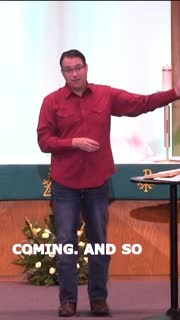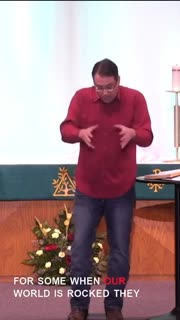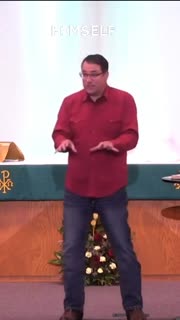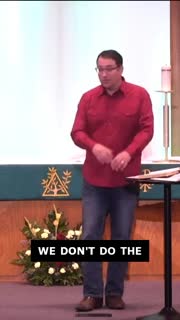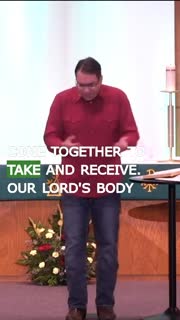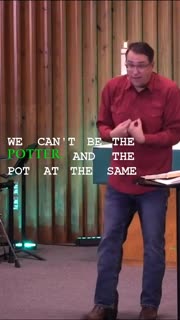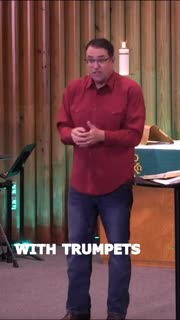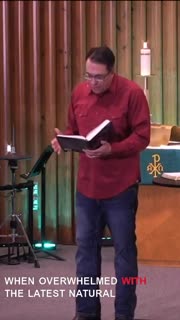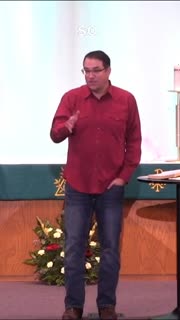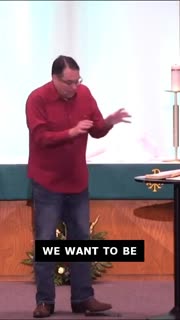Embracing Hope: The Messiah's Dual Nature and Our Mission
Devotional
Sermon Summary
Bible Study Guide
Sermon Clips
1. "A message of prophetic warning and of hope. That is what we have been reading in our readings through the book of Isaiah. In the first section of Isaiah, we looked at some of those things. In the last three weeks, in Isaiah chapters 1-39, those prophetic words through Isaiah, the prophet. And now when we get to the second section, we see some more prophetic promises, but also some extraordinary ways that God is going to work. In ways that seemingly are unexpected." [02:03] (60 seconds)
2. "For some when our world is rocked they run away from God. They don't want anything to do with God because God hasn't worked in the way that they thought He should work. And so they turn their backs on Him. And others though as Isaiah is inviting us to be is people who actually cling to God in those moments. That we turn to Him when things seem out of control. When chaos seems to be ruling and reigning. That we find ourselves humbled and brought to the presence of our Lord God. Who can answer and who does. Answer His people when they call to Him." [11:12] (32 seconds)
3. "If God explains himself to you. We saw this in Job a few weeks ago. That even if Job knew why he was suffering. It wouldn't make the suffering any easier. Knowing why or knowing the plan doesn't necessarily make it any easier. Because we still would rather it be the way that we want it to be. And so Isaiah recognizes this. And so he pummels himself under God. And realizes Lord you alone are God. You alone are in charge. Yes there are some days I want to know the reason. There are some days I want an explanation. But I'm going to be able to trust you. Because you're faithful to your people. You're faithful to your promises. I've checked the record. And there is no God except you." [14:26] (39 seconds)
4. "We don't do the things we should do. And we haven't done the things we should have done. This is our problem. And so we can join Isaiah and say. How can we be saved if we remain in our sins? The question is we can't save ourselves. We need you to act oh God. And this doesn't mean though. That we don't strive to do righteousness. We don't strive to walk in the path. That God would have us walk in." [15:29] (21 seconds)
5. "We will come together to take and receive. Our Lord's body and blood at this table. Knowing that we need that forgiveness of sins. Knowing that our faith doesn't always match up. To the works that we do. We will come in repentance. But when we get up from that repentance. We don't just simply say well I give up. And I guess I'm just going to sin. No we continue to strive after those things. God has given us to do. Knowing that it's his power that gives us the strength to do it. It's his might at work. Not our own." [16:26] (29 seconds)
6. "We can't be the potter. And the pot at the same time. We can't be the creator. We are the creation. And so we need his consuming and control. Or his conforming word. To be continuing changing our hearts. And our lives. For his sake. Isaiah looks forward to the day. As he prays this prayer. When God would break in. In the person and the work of the Messiah. The Christ. To bring about this redemption." [19:24] (27 seconds)
7. "He doesn't come with trumpets that are shouting. Or archangels that are blowing trumpets. Or the earth is shaking. But he comes in humble form. In the form of a servant. And in the cry of a newborn baby. Born in Bethlehem. To a teenage mom. Witnessed by those who were invited. Who were simply watching their sheep at night. But yet invited to see the arrival. Of the one that everyone had been waiting for. This Messiah. This coming king. But also this suffering servant. Who will bear on himself the sins of the world. And who by his death. And by his resurrection. Gives to us that forgiveness and life. And that salvation. That we so desperately need." [20:24] (44 seconds)
8. "When overwhelmed with the latest natural disaster, personal setback, family hurt, genocidal atrocity, or violent revolution, we are invited to look beyond our present tears and behold our future home in the Lord's new heavens and new earth. In the end, the Lord will vindicate his people. He will restore. He will restore all things. Then finally and forever, death will be dead. If this were not so, if life were random, without any divine plan, and death had the final word, then nothing would make sense. But biblical faith incests that on the last day, everything that is so wrong will finally be made right. Cosmic crumbling will give way to cosmic renewal." [23:10] (47 seconds)
9. "And so while we wait for that day, and while we wait for that return, our call is not simply to sit on the sidelines and say, come on God, any day now, get here. Our call is to get into the game. It's to join people like Isaiah. I mean, Isaiah, think about his ministry. Here he is over and over again proclaiming this message and the people don't repent. He even walks around naked for three years and they still don't repent. So we're not going to try that. We don't need to do that as the body of Christ. But we do other things, right? To make sure that message of Christ gets out to the places that God has positioned us." [25:12] (34 seconds)
10. "We want to be like Isaiah, recognizing that the message we have has to be proclaimed. The results are not always in our hands. Isaiah's results, I mean, if you look at his track record, he didn't accomplish anything. But yet he did. Because he proclaimed the word that God had given him to proclaim. And that word that goes forth from his mouth never returns void. And so the things that God has given you to do and the places that he's positioned you to do, I pray that he would give you an eternity mindset to recognize that that person that is before you is an eternal person." [29:20] (33 seconds)
Ask a question about this sermon
2. "For some when our world is rocked they run away from God. They don't want anything to do with God because God hasn't worked in the way that they thought He should work. And so they turn their backs on Him. And others though as Isaiah is inviting us to be is people who actually cling to God in those moments. That we turn to Him when things seem out of control. When chaos seems to be ruling and reigning. That we find ourselves humbled and brought to the presence of our Lord God. Who can answer and who does. Answer His people when they call to Him." [11:12] (32 seconds)
3. "If God explains himself to you. We saw this in Job a few weeks ago. That even if Job knew why he was suffering. It wouldn't make the suffering any easier. Knowing why or knowing the plan doesn't necessarily make it any easier. Because we still would rather it be the way that we want it to be. And so Isaiah recognizes this. And so he pummels himself under God. And realizes Lord you alone are God. You alone are in charge. Yes there are some days I want to know the reason. There are some days I want an explanation. But I'm going to be able to trust you. Because you're faithful to your people. You're faithful to your promises. I've checked the record. And there is no God except you." [14:26] (39 seconds)
4. "We don't do the things we should do. And we haven't done the things we should have done. This is our problem. And so we can join Isaiah and say. How can we be saved if we remain in our sins? The question is we can't save ourselves. We need you to act oh God. And this doesn't mean though. That we don't strive to do righteousness. We don't strive to walk in the path. That God would have us walk in." [15:29] (21 seconds)
5. "We will come together to take and receive. Our Lord's body and blood at this table. Knowing that we need that forgiveness of sins. Knowing that our faith doesn't always match up. To the works that we do. We will come in repentance. But when we get up from that repentance. We don't just simply say well I give up. And I guess I'm just going to sin. No we continue to strive after those things. God has given us to do. Knowing that it's his power that gives us the strength to do it. It's his might at work. Not our own." [16:26] (29 seconds)
6. "We can't be the potter. And the pot at the same time. We can't be the creator. We are the creation. And so we need his consuming and control. Or his conforming word. To be continuing changing our hearts. And our lives. For his sake. Isaiah looks forward to the day. As he prays this prayer. When God would break in. In the person and the work of the Messiah. The Christ. To bring about this redemption." [19:24] (27 seconds)
7. "He doesn't come with trumpets that are shouting. Or archangels that are blowing trumpets. Or the earth is shaking. But he comes in humble form. In the form of a servant. And in the cry of a newborn baby. Born in Bethlehem. To a teenage mom. Witnessed by those who were invited. Who were simply watching their sheep at night. But yet invited to see the arrival. Of the one that everyone had been waiting for. This Messiah. This coming king. But also this suffering servant. Who will bear on himself the sins of the world. And who by his death. And by his resurrection. Gives to us that forgiveness and life. And that salvation. That we so desperately need." [20:24] (44 seconds)
8. "When overwhelmed with the latest natural disaster, personal setback, family hurt, genocidal atrocity, or violent revolution, we are invited to look beyond our present tears and behold our future home in the Lord's new heavens and new earth. In the end, the Lord will vindicate his people. He will restore. He will restore all things. Then finally and forever, death will be dead. If this were not so, if life were random, without any divine plan, and death had the final word, then nothing would make sense. But biblical faith incests that on the last day, everything that is so wrong will finally be made right. Cosmic crumbling will give way to cosmic renewal." [23:10] (47 seconds)
9. "And so while we wait for that day, and while we wait for that return, our call is not simply to sit on the sidelines and say, come on God, any day now, get here. Our call is to get into the game. It's to join people like Isaiah. I mean, Isaiah, think about his ministry. Here he is over and over again proclaiming this message and the people don't repent. He even walks around naked for three years and they still don't repent. So we're not going to try that. We don't need to do that as the body of Christ. But we do other things, right? To make sure that message of Christ gets out to the places that God has positioned us." [25:12] (34 seconds)
10. "We want to be like Isaiah, recognizing that the message we have has to be proclaimed. The results are not always in our hands. Isaiah's results, I mean, if you look at his track record, he didn't accomplish anything. But yet he did. Because he proclaimed the word that God had given him to proclaim. And that word that goes forth from his mouth never returns void. And so the things that God has given you to do and the places that he's positioned you to do, I pray that he would give you an eternity mindset to recognize that that person that is before you is an eternal person." [29:20] (33 seconds)
